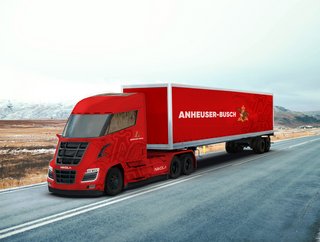AB InBev buys up to 80 hydrogen trucks from Nikola as part of sustainability drive

Beer giant Anheuser-Busch InBev (AB InBev) has reserved up to 800 hydrogen-fueled semi-trucks from Nikola Motor Company, as part of its 2025 sustainability plan.
The zero-emission trucks will be able to travel between 500 to 1,200 miles on one hydrogen fuel tank and can be refuelled within 20 minutes, according to the company.
AB InBev hopes to have all 800 Nikola trucks in its fleet by 2020, aiming to reduce its overall carbon emissions by 25% 2025.
The Budweiser beer maker said that it aims to convert its long-haul fleet to renewable powered trucks by 2025.
“At Anheuser-Busch, we’re continuously searching for ways to improve sustainability across our entire value chain and drive our industry forward,” said AB InBev CEO, Michel Doukeris.
“The transport industry is one that is ripe for innovative solutions and Nikola is leading the way with hydrogen-electric, zero-emission capabilities.”
SEE ALSO:
- Tyson Foods invests in lab-grown meat company Future Meat Technologies
- UK businesses make world-first Plastic Pact to slash plastic waste
- Danone sets 2030 goals for long-term sustainability
“Hydrogen-electric technology is the future of logistics and we’re proud to be leading the way,” added Trevor Milton, CEO of Nikola Motor Company. “Anheuser-Busch has a long history of investing in progressive, sustainable technology and we are excited to partner with them to bring the largest hydrogen network in the world to the USA.”
In December, AB InBev also announced that it had reserved 40 of Tesla’s electric Semi trucks, in which was thought to be one of the largest placed orders at the time.
As part of its 2025 sustainability goals, the US company has set itself ambitious targets for smart agriculture, water stewardship, circular packaging and climate action.
Speaking of its 2025 goals, Doukeris said: "Our company has been around for 165 years, and these goals will ensure that we continue to make meaningful contributions toward building strong communities and a healthy environment for the next 165 years.”
- Resurgence of Manufacturing Powering ReindustrialisationSustainability
- What's Apple’s Promise on Clean Energy and Water Investment?Renewable Energy
- Colgate-Palmolive’s Energy Efficiency Recongised Once AgainSustainability
- EY Helps Make Extreme E a ‘Sustainable Beacon’ of RacingSustainability






